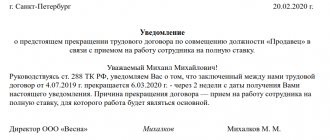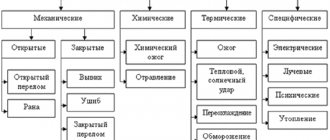Although it is believed that in our country there is no discrimination based on gender, nevertheless, many employers are reluctant to hire young girls who do not have children. However, young mothers cannot relax either. For those who already have at least one child, HR specialists invariably ask whether more children are planned. This is due to the fact that employers do not want their employees to go on maternity leave. It is also possible to understand them: a valuable employee who is in her place and effectively performs her duties in the event of pregnancy will have to look for a replacement. And this is a waste of time, resources, paperwork, etc.
But if pregnancy does occur, what should the employer do in this case? Is it possible to fire an employee working under a fixed-term contract, part-time or on a probationary period? Let's look at these and some other situations in more detail.
Question: Can an employer fire a pregnant part-time employee in connection with the hiring of an employee for whom this work will be the main one? View answer
What does the law say about dismissing a pregnant woman?
Since the rights of women expecting a child are protected in a special way, from the point of view of the law, it is almost impossible to fire an employee who becomes pregnant, regardless of her position and status. That is, if a woman does not want to leave her job, then the opposite desire of the employer does not matter. However, this is clearly interpreted if a pregnant woman is on the staff of the enterprise, but what if not?
How to fire a pregnant woman during liquidation of an organization ?
Pregnant woman - can she be fired?
Dismissing a woman who is expecting a child is a possible process, but only if she herself wishes it or agrees to a compromise. All other options are eliminated. But there is one exception. A pregnant woman may be dismissed from her position without her consent if the enterprise where she works is completely liquidated. There should be no reorganization or merger.
Attention
If the company continues its activities at least in some form, the expectant mother cannot be fired.
What is the criminal liability?
The State Labor Inspectorate, if there are grounds for doing so, has the right to transfer the results of consideration of a complaint against an employer to the Prosecutor's Office. In such circumstances, the guilty official faces criminal punishment.
The amount of penalties in criminal law far exceeds administrative ones - up to 200,000 rubles, or they can recover income received over a period of 1.5 years (Article 145 of the Criminal Code).
Intentional actions that resulted in the deprivation of work of a pregnant woman can also be punished by community service - up to 360 hours.
A woman who was illegally dismissed from an organization has the right to independently submit an application to the Prosecutor's Office.
During legal proceedings, unfair dismissal is proven, after which the rights of the dismissed employee are fully restored:
- a dismissed woman can continue to work in her previously held position;
- she is compensated for her dismissal;
- The entry made in the work book is completely canceled on the basis of a court decision (alternatively, a duplicate is issued).
It is not uncommon in these cases to compensate the injured party for moral damage if there is a corresponding requirement in the claim. The victim does not pay state duty.
Attention! Our qualified lawyers will assist you free of charge and around the clock on any issues. Find out more here.
Normative base
The Labor Code has the following articles that directly or indirectly relate to pregnant women:
- 64 – on the impossibility of refusing to conclude a contract indicating employment (if the reason is pregnancy);
- 70 – about the inadmissibility of assigning a probationary period if they are hired;
- 78 – about dismissal, the reason for which is the agreement of the parties;
- 80 – about settlement on individual initiative;
- 180 – on compensation for damage during the liquidation of a company;
- 234 – on compensation in case of dismissal not according to the law;
- 261 – on the impossibility of settlement if the employer takes the initiative (liquidation of a company is an exception, Article 81).
There is also Article 145 in the Criminal Code, which comes into force if the expectant mother is unjustifiably not hired or improperly fired. Next, we will consider different types of dismissal.
Fine for illegal dismissal
The actions of an employer who fired a pregnant employee qualify as an administrator. offense, the following sanctions are imposed:
- responsible managers who authorized such dismissal are punished with a fine in accordance with Article 5.27 of the Code of Administrative Offenses of the Russian Federation - in the amount of 5,000 rubles;
- for individual entrepreneurs the sanctions are similar;
- legal persons face more significant fines - from 30,000 rubles. up to 50,000 rub.
Need to know! The Labor Inspectorate has the authority to impose administrative fines in the labor sphere.
Reduction
If the staff at an enterprise is reduced, this does not affect expectant mothers. But the pregnancy needs to be confirmed. For this purpose, a certificate is obtained from a medical institution. Mere appearance is not a basis for having a legal defense.
If the necessary document is available and the position in which the pregnant woman works is reduced, she is selected for another type of activity that corresponds to her position. If this is not possible, she continues to work in her place.
Read more about reducing maternity positions here.
For absenteeism or under article
A pregnant employee who has confirmed this with an official document has many privileges. They also apply to violations of labor discipline. If a woman commits absenteeism (absent from work for more than four hours), she must explain the reason. In case of refusal, it is impossible to dismiss her for this under the article. However, some enforcement measures are provided:
- comment;
- rebuke;
- fine;
- deprivation of bonus.
Information
A prerequisite for this is the drawing up of an act proving that the employee was really absent without good reason.
From a letter to the editor
Hello! Help solve the problem. Is it possible to fire a pregnant employee due to the liquidation of a company or branch? Is it possible to dismiss an employee who is on maternity leave in connection with liquidation? We sent her several notifications, but all of them were returned as not received. Doesn't this entail any obligations to the employee, for example, to transfer her to a new company that may be created to replace this one? And what about social insurance benefits during liquidation?
Liquidation of the company
The only case that provides for the dismissal of a woman expecting a child without her consent is the liquidation of the organization. If she is already on maternity leave, the dismissal will still happen. A mandatory condition is a written warning. It is made two months before settlement. The woman must read the document and sign.
Attention
If only a branch of an enterprise closes, the pregnant woman is offered work in other branches or in the central office. If she is not satisfied with this, a settlement is made.
NTVP "Kedr - Consultant"
LLC "NTVP "Kedr - Consultant" » Services » Legal consultations » Issues of social security, pensions » About payments to employees (dismissal upon liquidation of the enterprise), including pregnant women
The organization is planning to liquidate it, employees are notified of dismissal 2 months in advance, and there are pregnant women who do not have time to go on maternity leave during this period.
Question
1) What guarantees and payments are available to pregnant women who did not have time to go on maternity leave? Does the Social Insurance Fund have any obligations to pay a certificate of incapacity for work for such leave?
2) What guarantees and payments are due to such pregnant women?
Lawyer's answer
We will inform you about the first question.
An employment contract with an employee can be terminated by the employer, in particular upon liquidation of the organization. In this case, the employer warns employees about the upcoming dismissal personally and against signature at least two months before the dismissal (clause 1, part 1, article 81, part 2, article 180 of the Labor Code of the Russian Federation).
When an employee is dismissed due to the liquidation of the organization, the employee is entitled to the following payments.
Payments according to labor laws
In the event of termination of the employment contract due to the liquidation of the organization, the employer is obliged to pay the employee the following amounts (Articles 127, 136, 140, 178, Part 3 of Article 180 of the Labor Code of the Russian Federation):
1) wages for the period of work before dismissal, bonuses, allowances and other payments;
2) monetary compensation for unused vacation;
3) severance pay in the amount of average monthly earnings (unless the labor or collective agreement provides for an increased amount of benefits);
4) additional compensation in the amount of average earnings in proportion to the time before the expiration of the notice period, if the employer dismisses the employee with his consent before the expiration of the two-month notice period;
5) average monthly earnings maintained for the period of employment of the employee, but not more than two months from the date of dismissal (including severance pay). In exceptional cases, the average monthly salary is retained by the employee for the third month from the date of dismissal by decision of the employment service body, provided that the employee applied to this body within two weeks after dismissal and was not employed by it.
Payments provided for in an employment or collective agreement
An employment or collective agreement may provide for additional cases of payment of severance pay, as well as establish increased amounts, with the exception of certain cases. Restrictions are established for certain categories of employees, for example, managers, their deputies, chief accountants of state or municipal institutions. Upon termination of employment contracts with such employees, the total amount of payments paid to them cannot exceed three times their average monthly earnings (Part 4 of Article 178, Article 349.3 of the Labor Code of the Russian Federation).
Note!
Additional compensation in connection with termination of an employment contract before the expiration of the notice period for dismissal is not subject to personal income tax. Compensation for unused vacation is subject to personal income tax in full. Severance pay, as well as the amount of average monthly earnings for the period of employment, are subject to personal income tax in the amount exceeding three times the average monthly earnings (six times the amount for dismissal from “northern” organizations) (Clause 3 of Article 217 of the Tax Code of the Russian Federation; Letter of the Ministry of Finance of Russia dated July 31 .2017 N 03-04-07/48592).
Features for certain categories of workers
For some categories of employees, special features are provided in terms of payments upon liquidation of an organization, namely (Articles 292, 296, 318 of the Labor Code of the Russian Federation; paragraph 15 of the Review, approved by the Presidium of the Supreme Court of the Russian Federation on April 26, 2017):
1) employees who have entered into an employment contract for a period of up to two months are, as a rule, not paid severance pay in the amount of average monthly earnings upon dismissal;
2) seasonal workers are paid severance pay in the amount of two weeks’ average earnings;
3) for part-time workers, the average salary for the period of employment is not retained;
4) employees of an organization located in the regions of the Far North and equivalent areas, the average monthly salary is retained for the period of employment, but not more than three months from the date of dismissal (including severance pay). By decision of the employment service body, the average monthly salary is retained by the employee during the fourth, fifth and sixth months from the date of dismissal, subject to a set of conditions:
- if within a month after dismissal the employee contacted the employment service;
- the employee was not employed by the specified body;
— there are exceptional circumstances related to the social vulnerability of the employee, his lack of means of subsistence, the presence of dependent disabled family members, etc.
Note. If after dismissal the employee is not employed, then he has the right to apply to the former employer for temporary disability benefits if the illness or injury occurs within 30 calendar days from the date of dismissal (Part 2 of Article 5 of the Law of December 29, 2006 N 255- Federal Law).
Situation: What payments are due to an employee upon dismissal due to the liquidation of the organization? (“Electronic magazine “ABC of Law”, 2017) {ConsultantPlus}
If the organization was liquidated before the onset of maternity leave, the benefit is assigned and paid by the social protection authorities at the place of residence (place of stay, place of actual residence).
In accordance with Art. 6 of Law N 81-FZ <1> and paragraphs. “b” clause 9 of Order No. 1012n <2> the right to receive maternity benefits, in particular, is given to women dismissed due to the liquidation of the organization. Maternity benefits are paid for a period of maternity leave lasting 70 (in case of multiple pregnancy - 84) calendar days before childbirth and 70 (in case of complicated childbirth - 86, for the birth of two or more children - 110) calendar days after childbirth (Article 7 of Law No. 81-FZ, clause 10 of Order No. 1012n).
————————-
<1> Federal Law of May 19, 1995 N 81-FZ “On state benefits for citizens with children.”
<2> The procedure and conditions for the appointment and payment of state benefits to citizens with children, approved. By Order of the Ministry of Health and Social Development of Russia dated December 23, 2009 N 1012n.
The specified benefit is paid in the amounts established in accordance with Art. 8 of Law No. 81-FZ (clause 12 of Order No. 1012n).
According to clause 15 of Order No. 1012n, for women dismissed due to the liquidation of an organization, benefits are assigned and paid by social protection authorities at the place of residence (place of stay, place of actual residence).
{Question: Who should assign and pay maternity benefits in the case where the organization was liquidated a month before the start of maternity leave? (“Remuneration: accounting and taxation”, 2014, N 4) {ConsultantPlus}}
Thus, during the liquidation of an enterprise, a pregnant woman is dismissed on a general basis. After dismissal due to the liquidation of an enterprise, a pregnant woman retains the right to receive the main types of material government support: accrual and payment of maternity benefits; payment of monthly child benefit. These payments are made by social protection authorities.
We will inform you about the second question.
The dismissal of an employee in the event of liquidation of the organization does not affect her right to receive maternity benefits.
In accordance with Art. 178 of the Labor Code of the Russian Federation upon termination of an employment contract in connection with the liquidation of an organization on the grounds of clause 1, part 1, art. 81 of the Labor Code of the Russian Federation, a dismissed employee is paid severance pay in the amount of average monthly earnings, and the average monthly salary is also retained for the period of employment, but not more than two months from the date of dismissal (including severance pay). This rule does not contain any exceptions for female employees on maternity leave. The condition is a dismissed employee.
Article 180 of the Labor Code of the Russian Federation establishes that employees are warned by the employer personally and against signature at least two months before dismissal about upcoming dismissal in connection with the liquidation of the organization, reduction in the number or staff of the organization's employees.
According to Art. 127 of the Labor Code of the Russian Federation, upon dismissal, an employee is paid monetary compensation for all unused vacations.
Labor legislation does not provide any exceptions for employees on maternity leave. The employer is obliged to pay the employee severance pay in the amount of average monthly earnings, as well as maintain the average monthly earnings for the period of employment, but not more than two months from the date of dismissal, and pay monetary compensation for all days of unused vacation.
Thus, the dismissal of an employee while on maternity leave is possible only in the event of liquidation of the organization; the employee is entitled to all the guarantees and compensation provided for during the liquidation of the enterprise. The employer is obliged to pay the employee severance pay in the amount of average monthly earnings, as well as maintain the average monthly earnings for the period of employment, but not more than two months from the date of dismissal, and pay monetary compensation for all days of unused vacation.
{Question: ...Is it possible to dismiss an employee who is on maternity leave at the initiative of the employer? What guarantees and compensation are she entitled to? (Expert Consultation, 2017) {ConsultantPlus}}
Selection of documents:
Question: ...Is maternity benefit subject to payment in full if maternity leave partially falls at a time when the employee who presented the certificate of incapacity for work will already be dismissed during the liquidation of the branch? (Expert Consultation, 2016) {ConsultantPlus}
The explanation was given by Igor Borisovich Makshakov, legal consultant of LLC NTVP Kedr-Consultant, October 2017.
When preparing the answer, SPS ConsultantPlus was used.
This clarification is not official and does not entail legal consequences; it is provided in accordance with the Regulations of the CONSULTATION LINE ().
Agreement of the parties
An agreement between the parties is a process in which the employer and the dismissed woman come to a common opinion on the following issues:
- settlement date;
- amount of monetary compensation;
- other points important for both parties.
Everything that the parties agreed on is indicated in the official document that they sign. It is created in two copies. One remains with the manager, the second - with the dismissed person.
Important
In this case, the duty of the pregnant woman is to submit an application for settlement, indicating the reason - the agreement of the parties.
How to prove that you were fired illegally
To hold the employer accountable, you will need to collect all the evidence. For example, witness statements. It is necessary to confirm a lot of information: what the perpetrator knew about the worker’s situation, the presence of a motive, the presence of intent.
The remaining points are easier to confirm. For example, to certify the illegality of the employer’s actions and prove the intentional dismissal of an employee under the guise of layoffs, it is necessary to confirm that the organization (IP) continued to operate.
Completion of a fixed-term contract
The peculiarity of a fixed-term contract is its conclusion for a specific period of time. Therefore, in the normal course, a person is automatically dismissed upon completion. If, in the process of fulfilling duties under a fixed-term contract, a woman becomes pregnant, the specifics of the legislation come into force.
They consist in the fact that the fixed-term contract with her is extended until the end of the pregnancy. If she decides to go on maternity leave, it is definitely granted. And only after its completion can the woman be fired. If pregnancy occurs during a fixed-term contract, she is obliged to:
- confirm it with a certificate from a medical institution;
- write an application requesting to extend the contract;
- if the employer asks, officially confirm the pregnancy every three months.
If a woman does not provide a certificate confirming her pregnancy by the end of the fixed-term contract, she is dismissed from her position. Also, dismissal can occur if the contract was concluded before the departure of the main employee. In this case, the pregnant woman is offered a different position. If she refuses, the contract terminates.
Do I need to confirm pregnancy and when?
Before we tell you what guarantees are provided to working pregnant women, let us clarify: not a single law specifies the period for notifying superiors about pregnancy. Judicial practice shows that even if the employer did not know that the employee was planning to become a mother, this does not relieve him of responsibility for violating the norms of the Labor Code of the Russian Federation (clause 25 of the Resolution of the Plenum of the Armed Forces of the Russian Federation dated January 28, 2014 No. 1).
Since not only employers, but employees themselves are interested in providing benefits, we recommend explaining to the female part of the team how and when pregnancy is confirmed.
The very first document indicating a woman’s interesting position is a registration certificate, which is issued at any antenatal clinic. If you register for up to 12 weeks, the expectant mother will be paid a one-time benefit (from 02/01/2019 - 655 rubles 49 kopecks) along with maternity benefits. But the document itself or a copy of it can be presented earlier if, for medical reasons or other reasons, the employee has already received the right to certain benefits. The registration certificate will help the employer provide all the guarantees to pregnant women under the Labor Code of the Russian Federation, and the workers themselves will not be left at a loss.
Dismissal procedure
The main reasons for the settlement of pregnant women are: their own desire, agreement of the parties and liquidation of the enterprise. In each case, the calculation procedure provides for some features.
Own wish
- The woman writes a statement 14 days before she plans to quit.
- Works for two weeks.
- An order is issued.
- The work book is properly prepared (an entry is made).
- Necessary payments are made.
Agreement of the parties
- An agreement is concluded (written type).
- If there was an agreement to work off, it is fulfilled.
- A woman writes an application for settlement.
- An order is issued.
- The work book is properly prepared (an entry is made).
- Compensation is paid in the form of cash.
Liquidation of the enterprise
- The employee is notified in writing of dismissal (period - two months).
- An order is issued.
- The work book is properly prepared (an entry is made).
- Compensation is paid in money.
At your own request
Any employee, and this rule applies to women in position, has the right to stop working if he wants to.
The procedural procedure for initiating termination of a contract on this basis is described in Art. 80 of the Labor Code of the Russian Federation: an employee, by submitting a resignation letter of her own free will, informs the employer of her decision two weeks before the desired date of dismissal. The two-week period is reduced by agreement with the manager (paragraph 2 of Article 80 of the Labor Code of the Russian Federation). If a woman changes her mind, she withdraws her application on any day during the warning period (paragraph 4 of article 80 of the Labor Code of the Russian Federation). Just as in all cases of termination of an employment agreement, the manager issues an order or instruction, pays off on the last day of work and makes an appropriate entry in the work book.
Working off
If a person quits his job because he wanted to, the law requires him to continue his work for another two weeks. This also applies to women expecting a child if they feel normal.
If a woman is admitted to a hospital for treatment, no work is carried out (the period of treatment is included in the work). In this case, the expectant mother must send an application to the enterprise by letter.
Information
If a woman is productive, but for some reason wants to quit immediately, this needs to be discussed with the manager. In fact, dismissal based on agreement between the parties is more suitable here.
What is paid upon dismissal?
If a regular settlement occurs at the woman’s request, the money she earned is paid, which she did not receive at the time of leaving the enterprise. Compensation for vacation that was not used is added to this. If the release from work occurred by agreement of the parties, some other payments may be added to this amount. This is stipulated in a document signed by the manager and the dismissed person.
Attention
If the business is liquidated, severance pay is added in addition to normal statutory payments. Its calculation is based on the average monthly salary of the employee.
Payment of severance pay is maintained for 2 months, in the absence of employment at a new place of work.
Wrongful dismissal of a pregnant woman is the employer’s responsibility
An employee who is planning to take maternity leave in the future sometimes begins to experience psychological pressure from her manager. Indeed, due to her position, she will no longer be able to fulfill her duties in the future. This means she will have to find a temporary replacement. This may not suit the employer, who wants his subordinates to fully devote themselves to work. Therefore, a pregnant woman is given conditions in which it is difficult for her to work. This is done in order to bring her to a state in which she herself wants to leave the enterprise.
Some people really can’t stand the pressure and write such a statement. But this is unlawful, since in fact the person wanted to continue his activities. Therefore, as soon as a woman receives a work book, she has the right to protection in court. However, it will be necessary to prove that the dismissal actually occurred against her will.
Attention
If a pregnant woman was fired for reasons such as staff reduction or the end of a fixed-term contract, this is illegal. For this, the employer is held liable (Criminal Code, Article 145). For unlawful actions, he may be ordered to pay a fine (up to 200 thousand rubles or another amount). Mandatory work up to 360 hours is also possible.
What working mothers-to-be have the right to expect?
Certain prohibitions and guarantees for pregnant women under the Labor Code also exist in situations where a woman is preparing to become a mother after some period of work in a company. According to current regulations, she has the right:
| Name of guarantee | Link to norm |
| Part-time work | Art. 93 Labor Code of the Russian Federation |
| Light work (for medical reasons) while maintaining the average earnings at the previous place of work | Art. 254 Labor Code of the Russian Federation |
| Maintaining average earnings during the period of medical examination | Art. 254 Labor Code of the Russian Federation |
| It is prohibited to send on business trips | Art. 259 Labor Code of the Russian Federation |
| Cannot be hired to work the night shift | Art. 96 Labor Code of the Russian Federation |
| Cannot be required to work overtime | Art. 99 Labor Code of the Russian Federation |
| It is prohibited to engage in work on a rotational basis | Art. 298 Labor Code of the Russian Federation |
| May not work on weekends and holidays | Art. 259 Labor Code of the Russian Federation |
| Has the right to take annual paid leave at any time before and after maternity leave, even if the continuous experience in a particular company is less than 6 months | Art. 122 and 260 Labor Code of the Russian Federation |
| It is forbidden to recall from vacation | Art. 125 Labor Code of the Russian Federation |
| Can receive maternity leave (from 27-30 weeks of pregnancy if there is a sick leave issued by a doctor) with payment of benefits in the amount of 100% of earnings | Art. 255 Labor Code of the Russian Federation |








